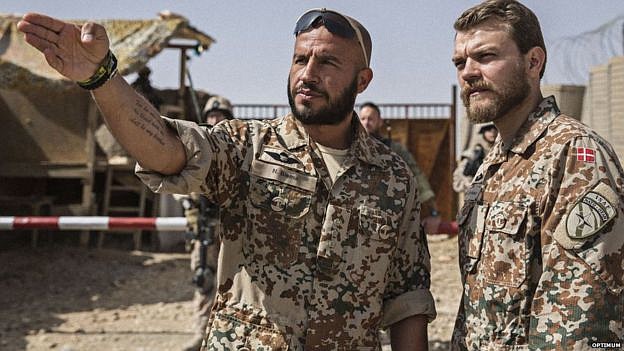- November 23, 2024
-
-
Loading

Loading

"A War" questions whether one can be good and guilty at the same time. And as films about war do portray the senseless nature of them, this Danish entry about the conflict in Afghanistan vividly underscores that concept.
As the film opens, Claus Pedersen (Pilou Asbaek), the commander of a unit, tries to keep his men focused after having lost one to an IED (improvised explosive device). Soon after, Claus and his company are on patrol, when they're suddenly ambushed. One of his men is severely wounded and is about to be airlifted out when Claus orders the bombing of a nearby house to ensure a safe exit.
Although the unit was being heavily fired upon at the time, Claus' judgement will come under attack after the clash. It seems that 11 civilians, including children, were killed during the siege. Soon he finds himself back in Denmark, facing charges. Another kind of war will be waged in court.
This is the third feature film, in which writer-director Tobias Lindholm and Pilou Asbaek have worked in tandem ("R" and "A Hijacking," previously). And their alliances are nothing short of perfection. "A War" not only tallies the toll taken on soldiers but, of equal importance, the cost to loved ones. Prior to his trial, Claus' wife wants him to lie in order to protect their family. In desperation, she comments, "You may have killed eight kids, but you have three living ones at home." The battle lines are not so simply drawn.
Soldiers killing children and enemies using them as human shields brings home the vulgarity of human conflicts. Claus' war of conscience brought about by rules of engagement seems somewhat hypocritical when looking back at historical events, like the bombing of Hiroshima. How, all of a sudden, have we become so righteous about the casualties of one war and not another?
Lindholm demonstrates that there is nothing righteous about war in this provocative and powerful film. It "shaves away the souls" of soldiers, decimates populations and breaches morality.
"A War" will leave you asking questions. Just when did Denmark get involved? Why do trained killers face prosecution for doing their job? But most importantly, when will those responsible for this mayhem see their day in court?